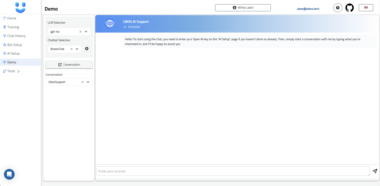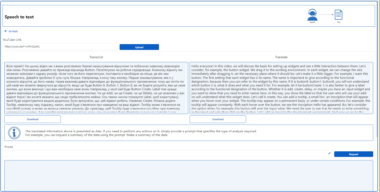Unleash the Power of AI with Remote MCP Servers on UBOS: A Comprehensive Guide
In the rapidly evolving landscape of Artificial Intelligence (AI), the ability to seamlessly integrate Large Language Models (LLMs) with external data sources and tools is paramount. This is where the Model Context Protocol (MCP) steps in, offering a standardized approach to providing context to LLMs. At UBOS, we champion this approach, understanding its crucial role in enabling businesses to harness the full potential of AI. This guide delves into deploying and utilizing remote MCP servers, particularly within the Cloudflare Workers environment, while highlighting the powerful synergies with the UBOS AI Agent Development Platform.
What is MCP and Why Does It Matter?
MCP, or Model Context Protocol, acts as a crucial bridge. It standardizes how applications provide context to LLMs. Imagine an AI agent needing to access your CRM data, real-time stock prices, or specific functions within your internal tools. MCP provides the rules and structure for this interaction, ensuring LLMs receive the necessary information in a consistent and understandable format. This standardized approach unlocks numerous benefits:
- Enhanced LLM Performance: By providing relevant context, MCP significantly improves the accuracy, relevance, and usefulness of LLM outputs.
- Simplified Integration: MCP streamlines the process of connecting LLMs to various data sources and tools, reducing development time and complexity.
- Increased Security: MCP can incorporate security measures, ensuring that LLMs only access authorized data and resources.
- Improved Scalability: MCP allows you to efficiently manage and scale your AI applications as your needs grow.
Setting Up a Remote MCP Server on Cloudflare Workers
Cloudflare Workers provides an excellent environment for deploying remote MCP servers due to its serverless architecture, global network, and ease of use. Here’s a step-by-step guide to getting your remote MCP server up and running:
1. Local Development:
- Clone the Repository: Begin by cloning the necessary repository from GitHub:
git clone git@github.com:cloudflare/ai.git - Install Dependencies: Navigate to the
aidirectory and install the required dependencies usingnpm install. - Run Locally: Launch the server locally using the command
npx nx dev remote-mcp-server-bearer-auth. This should make the server accessible in your browser athttp://localhost:8787/.
2. Connecting the MCP Inspector:
The MCP Inspector is a valuable tool for exploring and testing your MCP API.
- Start the Inspector: Initiate the inspector with the command
npx @modelcontextprotocol/inspector. - Configure the Connection: Within the inspector interface (typically at
http://localhost:5173), set the Transport Type toSSE(Server-Sent Events) and specify the URL of your MCP server ashttp://localhost:8787/sse. Add a bearer token for authentication. - Establish Connection: Click “Connect” to establish a connection between the inspector and your local MCP server.
- Test Functionality: Use the “List Tools” option and execute the “getToken” tool to verify the connection and retrieve the Authorization header.
3. Integrating with Claude Desktop:
To connect Claude Desktop to your local MCP server, configure the following settings:
"remote-example": {
"command": "npx",
"args": [
"mcp-remote",
"http://localhost:8787/sse",
"--header",
"Authorization: Bearer {token}"
]
}
4. Deploying to Cloudflare:
Deploy your MCP server to Cloudflare using the command npm run deploy. This will deploy your worker to the Cloudflare network.
5. Connecting from a Remote MCP Client:
To connect to your deployed MCP server from a remote client, use the MCP inspector:
- Start the Inspector: Run
npx @modelcontextprotocol/inspector@latest. - Configure Connection: Enter the
workers.devURL (e.g.,worker-name.account-name.workers.dev/sse) of your deployed worker in the inspector and click “Connect”. You can pass in a bearer token for authentication as needed.
6. Debugging:
If you encounter issues, consider the following debugging steps:
- Restart Claude: Restarting Claude can sometimes resolve connection problems.
- Direct Command-Line Connection: Test the connection directly using the command
npx mcp-remote http://localhost:8787/sse. - Clear Authentication Files: In rare cases, clearing the files in
~/.mcp-authmight help:rm -rf ~/.mcp-auth.
Key Use Cases for MCP Servers
MCP servers open up a wide range of possibilities for AI-powered applications:
- Contextual Customer Support: Integrate an LLM with your CRM system via an MCP server to provide customer support agents with real-time customer data and interaction history.
- Intelligent Document Processing: Connect an LLM to a document repository via an MCP server to enable intelligent document summarization, analysis, and extraction.
- Personalized Product Recommendations: Use an MCP server to feed an LLM with user data and product information to generate personalized product recommendations.
- Automated Code Generation: Integrate an LLM with a code repository via an MCP server to automate code generation, review, and testing.
Key Features of a Robust MCP Server Implementation
- Secure Authentication: Implement robust authentication mechanisms (e.g., OAuth, API keys) to protect access to your MCP server.
- Data Transformation: Provide mechanisms for transforming data from various sources into a format suitable for consumption by LLMs.
- Rate Limiting: Implement rate limiting to prevent abuse and ensure fair usage of your MCP server.
- Monitoring and Logging: Monitor the performance of your MCP server and log all requests for debugging and auditing purposes.
- Scalability: Design your MCP server to scale horizontally to handle increasing traffic and data volumes.
UBOS: Empowering Your AI Agent Development with MCP
UBOS is a full-stack AI Agent Development Platform designed to streamline the creation, deployment, and management of AI agents. Our platform seamlessly integrates with MCP, allowing you to:
- Orchestrate AI Agents: Easily manage and coordinate the interactions between multiple AI agents.
- Connect to Enterprise Data: Securely connect your AI agents to your enterprise data sources via MCP.
- Build Custom AI Agents: Develop custom AI agents tailored to your specific business needs, leveraging your own LLM models.
- Create Multi-Agent Systems: Design and deploy complex multi-agent systems that can solve complex problems collaboratively.
By leveraging the UBOS platform with MCP servers, businesses can unlock the full potential of AI and drive innovation across their organizations. UBOS simplifies the complexities of AI agent development, allowing you to focus on building impactful solutions that deliver real business value.
Conclusion
Deploying a remote MCP server is a crucial step towards building intelligent and context-aware AI applications. By leveraging Cloudflare Workers and integrating with platforms like UBOS, you can unlock the full potential of LLMs and create innovative solutions that drive business growth. The combination of UBOS’s robust AI agent development platform and the standardized context delivery of MCP empowers businesses to build truly transformative AI-powered applications. Embrace the power of MCP and UBOS to lead the way in the AI revolution.
Remote MCP Server with Bearer Authentication
Project Details
- huanshenyi/mcp-server-bearer-auth
- Last Updated: 4/17/2025
Recomended MCP Servers

Grok open release
MCP server for TickTick integration
A Model Context Protocol (MCP) server implementation that provides database capabilities for Chroma
An MCP Server for personal YouTube feeds via OAuth

A Model Context Protocol (MCP) Server for https://joplinapp.org/ that enables note access through the https://modelcontextprotocol.io. Perfect for integration...

Evaluate if a task requires human intervention
Ethereum Tools for Claude - A comprehensive blockchain analysis toolkit that enables Claude AI to audit smart contracts,...

Model Context Protocol Server of Rod

A Nostr MCP server that allows to interact with Nostr, enabling posting notes, and more.
 From vibe coding to vibe deployment. UBOS MCP turns ideas into infra with one message.
From vibe coding to vibe deployment. UBOS MCP turns ideas into infra with one message.





